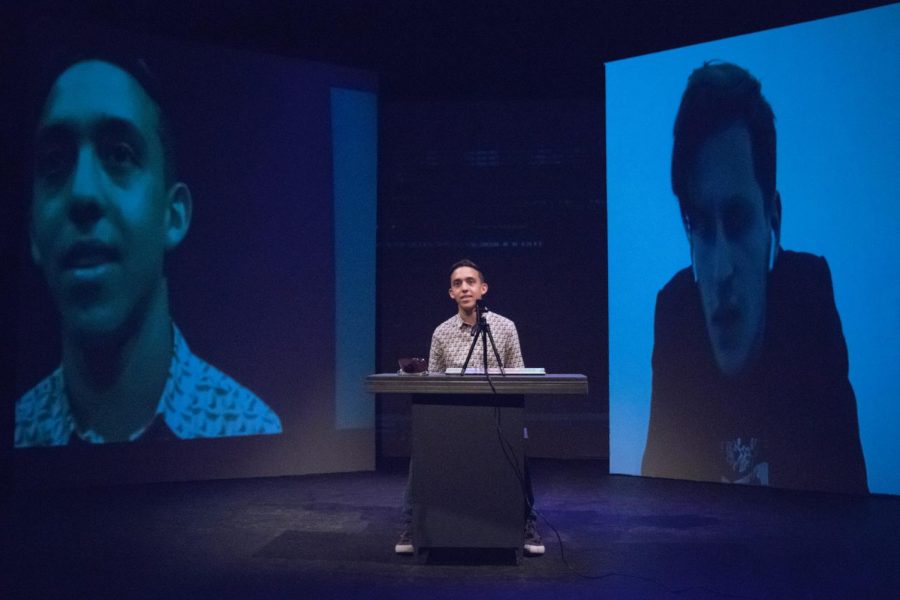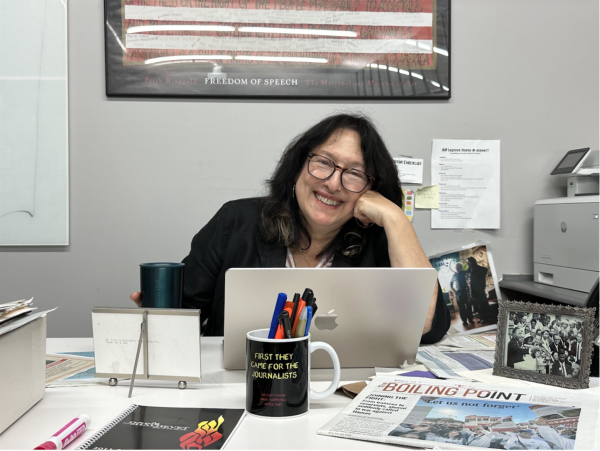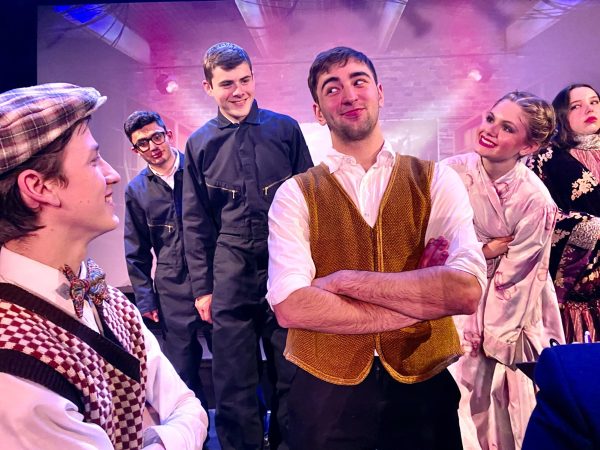Connecting the disconnected in ‘Technical Difficulties’
Drama presents seven student-written one-acts which were more about humans than machines
With an overarching title of Technical Difficulties, the seven original plays in this year’s One-acts Festival all explored the way that human relationships are tested or strengthened by games and technology.
From the dark side of computer spying to being outdoors sans cellphone service or see-sawing on a playground, they showed how an increasingly technological world has vast and powerful potential to connect people, but also poses new challenges to relationships, while non-electronic games were depicted as a more stabilizing connector for humanity.
The festival had public performances April 7 and 11, and student performances throughout that school week, all in the Wildfire Theater behind the gym.
Overlooked, which was written and directed by Hannah Merritt, shed light upon the increasingly common reality of invasive technological monitoring.
A data analyst named Fin watches a teenage girl as she walks the school hallway, texts her boyfriend, and gossips with a friend. Played by senior Adam Ritz, Fin is observing Shelby, played by senior Donna Grunfeld, but not in person or even on television — he’s watching from a computer screen far away. Without her knowledge, he is monitoring her cell phone activity for the company he works for.
The production used two wall-size screens, which projected pre-recorded scenes in the play that were interspersed with the live action on the stage. One showed the view from Shelby’s cell phone, which Fin was monitoring, and the other showed Fin’s boss, played by Jacob Lefkowitz Brooks, holding long-distance conferences with him. This involved a well-executed feat of timing for Adam, who had to sync his lines with the projections of everyone involved, sometimes including a recorded version of himself.
Fin becomes concerned when he sees Shelby being the victim of abusive behavior. Despite repeated warnings from his boss, played by junior Jacob Lefkowitz Brooks, he begins to monitor her with more care than is professionally necessary.
The festival’s most powerful and disturbing play, Overlooked captured the conflicts between empathy and professionalism as Adam’s character questions whether to overstep professional boundaries in order to potentially save her.
Ultimately, he intervenes to help, which is objectively beneficial to her, but likely professionally damaging to him — and which also exposes technology’s challenge to anyone’s right to privacy, even as it takes on an increasingly integral role in human life.
Some comic relief was provided by Recess, written by Ariel Urman and directed by drama teacher Ms. Emily Chase. Expanding the meaning of “technical” far beyond what we usually think of as 21st-century technology, Recess showed two elementary-schoolers, played by freshman Talya Kukurudz and sophomore Rebecca Cohen, navigating playground social conflicts.
With Talya as a cheerful but unconfident girl who gradually emerges from the shadow of Rebecca’s character’s mean friendship, Recess managed to make interpersonal power dynamics hilarious and provoked laughter throughout. Beyond the actors’ hilariously recognizable portrayal of childhood immaturity and their perfect comedic timing, the play clearly resonated with audience members’ experiences of bullying and the conflicts within friendships that endure far beyond the grade-school years.
Two of the plays, Team Building and Family Game Night, were expressly about what technology takes away. Team Building, by Jacob Lefkowitz Brooks, explored friendship dynamics through the more specific lens of teenage-hood, showing modern technology as a barrier to connection while distance from screens can by itself foster truer relationships.
Donna Grunfeld and Hannah Merritt portrayed high school juniors in different social groups who had never been friends. But separated from their camping groups — and their cell phones, the girls talk, working through differences that had only been presumed of one another because they had never spoken. When human connection is the only option, the girls overcome their differences.
In a similar vein, Family Game Night showed board games as a unifier in an act that mixed comedy with nostalgia and some family guilt. Written by freshman Noah Masliah and directed by Hannah Merritt, the play starred Haim Oliel as a young boy who wants to enjoy a family game night with his sister, played by Ariel Urman, and father, played by Albert Gordon, the way had in the past.
“I miss being a family!” Haim’s character of Derek cries, when both his dad and sister disappoint him by having other plans that night.
Both eventually cancel other plans in order for the three of them to spend the evening together. The games serve as a unifying force in their family, where the distractions of their fast-paced lives had been forcing them apart. The actors infused the performance with subtle and sweet nostalgia and heartwarming humor.
A family’s bonds are tested again in Dance, written by sophomore Rebecca Cohen and directed by Donna Grunfeld. Two teens, played by Hannah Poltorak and Anna Weiss, practice a dance routine, and then one gets news that her family is moving to another city before the performance.
An older sister — also a dancer — played by freshman Talya Kukurudz must convince their parents to let her stay in town long enough to perform. In this scene, dance bonds the two sisters, mending a strained relationship.
Comedy is a Serious Business showed the irony of that statement through a layered scene in which senior Daniel Medovoy played Bruce, an actor who pitches a script idea to “Neima Fax-Machine,” a robot eponymously played by junior Neima Fax. The robot rejects all script ideas as “not funny enough,” asserting that human comedy is unnecessary because robots have conquered the world and can do it better anyway.
The scene, written by freshman Dallas Corn and directed by Donna Grunfeld, highlighted comedy’s role in enabling people to bond. It left the audience questioning the extent to which technology should overtake society, impacting even the most fundamental human traits, like a universal sense of humor.
From the world of sports — the real kind — Benchwarmers by senior Albert Gordon offered an ode to competition, luck and the intensity of the clock.
Sophomores Hannah Poltorak and junior Anna Weiss cheered, groaned and bickered as high school basketball players Cal and Jordan experiencing a game from the bench.
The pair spend the entirety of the game hoping to be chosen to play, and therefore wish vocally for another player to foul out. Their conversation throughout the scene, which was directed by Ms. Chase, revolves around whether either of them will be chosen and how desperately they want to be played.
As the suspense reaches its climax, Cal is finally moved off the bench — and the buzzer goes off, meaning the game is over and he’ll have no time on the court after all. The actors convincingly portrayed the eager, invested enthusiasm similar to that seen of Shalhevet’s own Firehawk team.
But meanwhile, the excitement of the game has bonded the players regardless of whether they actually played.
For everyone who saw it last month, Technical Difficulties highlighted just how influential both technology and games are in people’s lives and interactions. Games, it said, provide a reliable source of passion and camaraderie, while technology proves to be more complicated. Thus, the title is meant both literally and figuratively, because with technology comes complications, and with games come normal human difficulties.
But conflict, the festival showed, is present in both. Technology’s impact on such crucial behaviors such as humor, bonding and personal security is complicated and only beginning to be understood. By contrast, the games of the past could appear as more simplistic and understandable, coming with more familiar conflicts than the ones society has now begun to grapple with — and partly through the mirror of plays like these.

Lucy Fried was co-editor-in-chief during the 2018-19 school year and went on to study at the Hartman Institute in Jerusalem. She is now a junior at UC Berkeley.










